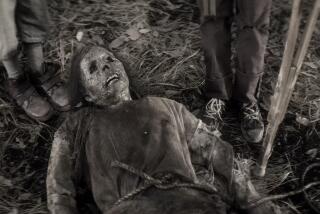War’s lingering damage
- Share via
You didn’t need to understand Spanish, much less the Inca language of Quechua, to grasp the ancient race and class conflicts played out in “Santiago.” The haunting, dreamlike drama by Peru’s provocative theater troupe Grupo Cultural Yuyachkani, opened Thursday at REDCAT. Ugly, unhealed wounds of colonial conquest and religious warfare are embodied onstage in the very image of the play’s title character, known in English as St. James the Apostle.
In Spain, his full name is Santiago Matamoros, the Moor-killer, who helped expel Islamic occupiers before Columbus sailed. In the Americas, he’s known as Santiago Mataindios, the Indian-killer, who symbolizes imperial domination. Either way, he must be the most politically incorrect saint in the Catholic pantheon.
Historically, he’s pictured in romantically heroic poses as a bearded European astride a white stallion, draped in a gilded cape with a fearsome sword held overhead and dead or dying Moors trampled underfoot. In Yuyachkani’s 90-minute drama, the dark-skinned heathen being trampled is portrayed by a real, live Indian, one of three actors in the play written by the troupe and Peter Elmore. The flesh-and-blood victim, played with remarkable athleticism by the sinewy Amiel Cayo, voluntarily assumes the position of a vanquished race. In one stunning scene, he leaps up on a cross to crucify himself.
It’s another moment of wordless power in a work of fierce dialogue (with limited English supertitles). The heavily Peruvian audience obviously got the script’s dense and esoteric meanings, even laughing at parts in Quechua. Others understood the message viscerally: epic cultural clashes leave disturbing social scars even centuries after the wars that supposedly settled them.
“Santiago” was first presented in 2000 by this acclaimed theater ensemble from Lima, which meant to address the ravages of Peru’s recent civil war, a slash-and-burn political conflict pitting fanatical Maoist guerrillas against a vengeful military.
It tells the story of the last three inhabitants of a ghostly Andean town, ensconced in a spooky, candle-lighted church. Augusto Casafranca is the haughty “mayordomo,” or MC of the annual fiesta, bearded, white-skinned and arrogant. Ana Correa plays the plaintive Bernardina, the long-suffering Indian mother who has lost her children. And Cayo is Rufino, the tormented temple caretaker who displays a stoic tolerance for pain. The trapped trio decides to revive a ritual that had been suspended for 15 years, carrying an effigy of Santiago in a procession through the town.
The saint’s dual identity is revealed when Rufino comes to recognize Santiago as Yllapa, the Indian god of thunder, a syncretism that historically helped the conquered accept new masters. The drama rests in the uneasy balance between reverence and sacrilege, submission and revolt, despair and hope.
In the end, the play’s cautionary tale strikes a universal chord. “Santiago” has an eerie resonance to our conflict in Iraq that again pits Christians against Muslims. “The war has ended,” says Bernardina, “but when will peace arrive?”
*
Grupo Cultural Yuyachkani
Where: REDCAT at Walt Disney Concert Hall, 631 W. 2nd St., L.A.
When: 8:30 p.m. today and Sunday
Ends: Sunday
Price: $16 to $28
Contact: (213) 237-2800
Running time: 1 hour, 30 minutes
More to Read
Sign up for Essential California
The most important California stories and recommendations in your inbox every morning.
You may occasionally receive promotional content from the Los Angeles Times.













